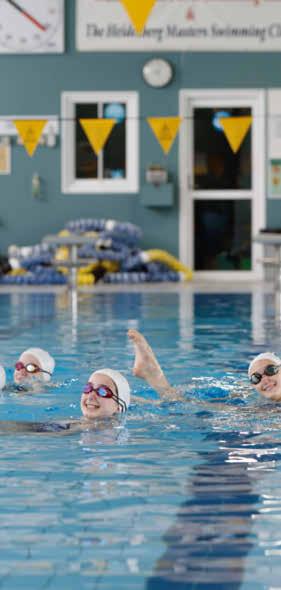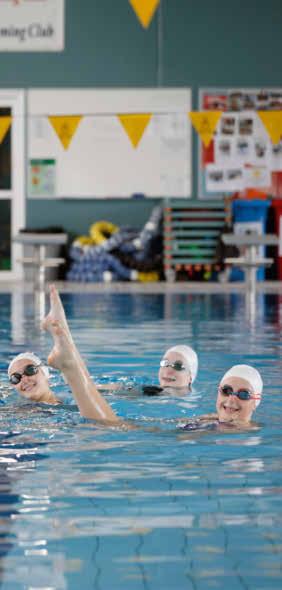
5 minute read
Trinity Grammar School, Kew
Principal Adrian Farrer
Adrian joined Trinity from Cathedral College at the beginning of 2020 as our 12th principal. His focus on developing the whole person aligns closely with our philosophy of balancing the academic, pastoral and co-curricular domains. 40 Charles Street, Kew VIC 3101
Advertisement
Trinity Grammar School, Kew has educated boys from Melbourne and beyond for almost 120 years. Our traditions are strong, and our motto “Viriliter Agite” – Act Manfully – remains our guiding principle. A modern view of manfulness, however, requires much more than its traditionally ascribed characteristics of courage and stoicism.
We strive to make our students aware of the opportunities that exist to be globally good – good in the world and good for the world – as well as the opportunities to succeed in their personal and professional endeavours. Our values of service, integrity, courage and humility are a strong foundation for a life lived well.
Our teachers are passionate about delivering a broad and stimulating curriculum that engages our boys and challenges them to achieve their best. They have a genuine interest in connecting with each of the boys in their care, and helping them to develop positive relationships across the school. The sense of community and inclusivity among students of all ages is strong thanks to our vertical peer mentoring structures and positive role modelling by senior students.
We believe a school can be judged on the quality of character of its graduates, and we are immensely proud of the achievements of generations of Trinity Grammarians.
THE BASICS
Enquiries
+61 3 9854 3600 trinity.vic.edu.au trinity@trinity.vic.edu.au
Years
ELC3 – Year 12
Denomination
Anglican
Gender
Boys
Fees
$22,604 – $33,376
Boarding \ Yes
Scholarships \ Yes
ATAR \ Median 89*
ACADEMIC
Trinity is proud of our students’ outstanding academic results. Impressively, 21 of our 2020 cohort were in the top 1 per cent of the state, 49 per cent achieved an ATAR over 90, and 24 per cent achieved scores over 40.
SPORT
Trinity competes in the AGSV Saturday morning competition. All senior boys choose a summer and a winter sport from over 30 options. Our playing fields at Bulleen provide facilities for tennis, soccer, rugby, football, hockey and cricket.
* Results are provided by the school, Domain does not warrant their accuracy
CO-CURRICULAR
A wide range of co-curricular activities caters for the interests and passions of all boys. Activities include almost 30 different individual and team sports, debating and public speaking, drama, musical ensembles, chess and bushwalking.
WELLBEING
Our vision is the holistic development of each student; spiritually, emotionally intellectually, physically, socially and morally, supported by our religious and values-based education and engaging personal development curriculum.
FINDING PASSION AND PURPOSE
Engaging in co-curricular activities and clubs has a multitude of benefits.
BY JOANNE BROOKFIELD
BEYOND THE CLASSROOM
The late British educationist and creativity expert, Sir Ken Robinson, defined in his book The Element a particular point at which natural talent meets personal passion, leading in turn to achievement at the highest levels.
“It’s a fantastic book that talks about how finding your passion really helps you find yourself,” says Ivanhoe Girls’ Grammar School’s head of senior school and deputy principal Davina McClure. “I think students do find their element when they have that choice of being involved in a co-curricular activity.”
At Ivanhoe, there are more than 30 clubs and activities available to students, in addition to performing arts groups and sports teams.
“We have more than 20 ensembles that include choirs, chamber groups, orchestras and bands,” she says.
As part of Girls Schools Victoria (GSV), Ivanhoe’s students have the opportunity to compete in week-day inter-school sports that include softball, badminton, volleyball, indoor cricket and hockey, with the school also offering its own sports program, which takes in different experiences like circuit training, aerobics and fencing. Those who might not be athletically inclined also have a range of other options, from areas as diverse as coding and chess, to gardening and knitting.
“Co-curricular activities are significant for enriching students on an emotional, cognitive, physical, and social level,” says Megan Fritsch.
As president of the Career Industry Council of Australia, Fritsch knows the value of such activities when it comes time for students to enter the workforce.
“The rewards of co-curricular activities in schools have been researched pretty well and it is now ascertained that students who participate in these activities show better academic results, stronger relationships in schools and are more likely to lead a healthy and active lifestyle,” she says.

“Experiences and skills acquired through these co-curricular activities make students proactive and prepared for their future endeavours,” she adds, which is why they are so appealing to employers when they see them on CVs.
For former Wesley College student Caity Price, this was certainly her experience. Now 24, she is working at the Australian Securities and Investments Commission as a market surveillance analyst, having graduated with arts/law degrees and been admitted as a solicitor by the Supreme Court of Victoria. While attending Wesley from kindergarten through to year 12, she played violin in the orchestra and was on the school’s softball and skiing teams.
Discovering a passion for these sports, she also joined clubs outside of school, which opened up further social and travel opportunities. It also helped her transition into tertiary education.
“Especially at uni, I played a lot of softball, and went to UniGames, which enabled me to get involved in campus life in ways I otherwise wouldn’t have,” she says. This included founding a softball club, which led to her sitting as a board member on ANU Sport.
Looking back now, she can see so many other benefits that set her up for success. Not only did playing sports teach her about “hard work, diligence and empathy in understanding people from different backgrounds”, she says she also acquired a suite of professional skills such as “managing people, following through with a strategic purpose, creating both long and short term direction of an entity, managing logistics and finances”.







